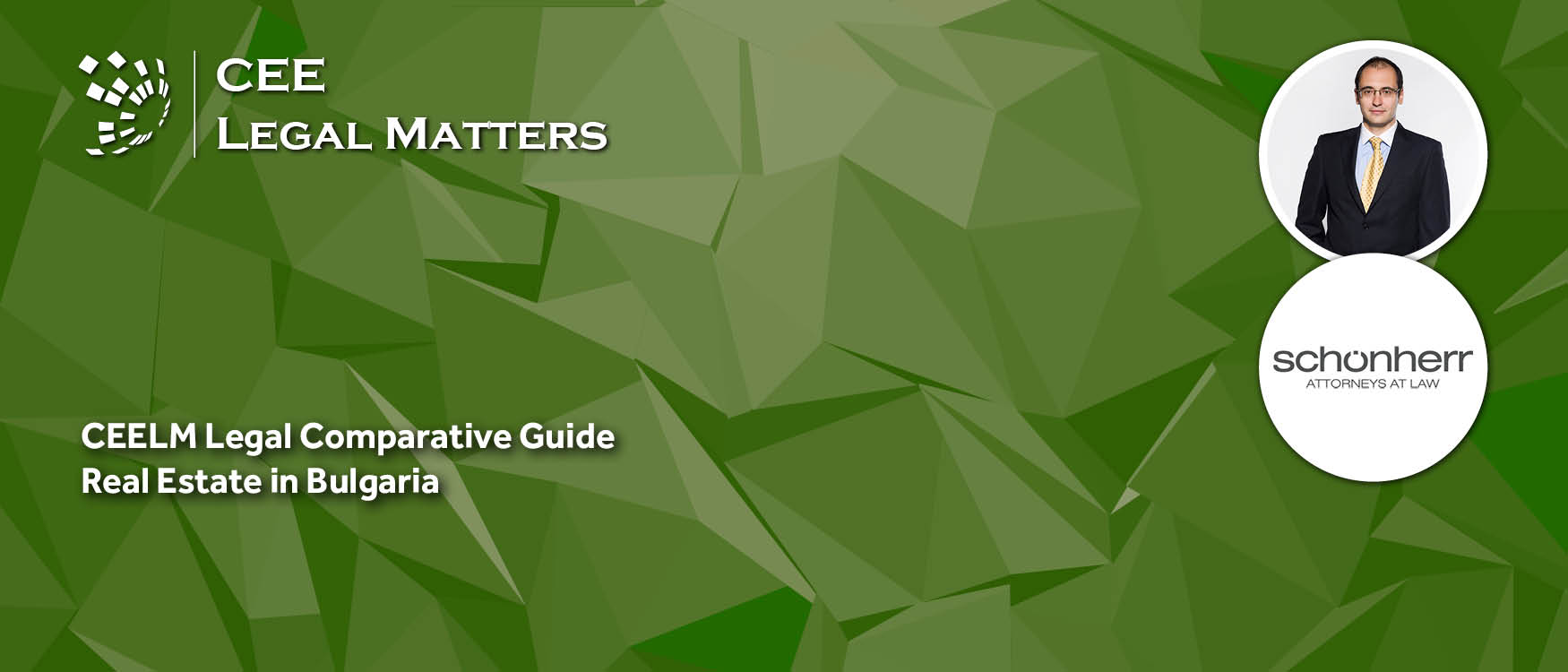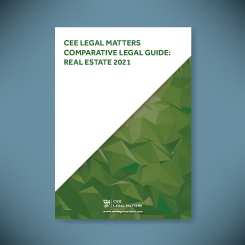Contributed by Schoenherr.
1. REAL ESTATE OWNERSHIP
1.1 Legal framework
The right of ownership is a fundamental right under the Bulgarian Constitution. Article 17 of the constitution explicitly provides that real estate ownership, including the right to inheritance, is guaranteed and protected by law.
In Bulgaria, property (including real estate) is private or public (state or municipal property). State and municipal property are differentiated into public state and private state property, or public municipal and private municipal property. The law expressly defines which real estate constitutes public state or public municipal property. Any real estate which is state or municipal property but is not defined as a public state or public municipal property constitutes private state or private municipal property.
The rights of all real estate owners (private or public) and the protection given by the law to such rights are equal, except for the possibility of real estate constituting public state or public municipal property to be subject to disposition or encumbrance and acquisition by prescription (continuous possession for five years in good faith or otherwise continuous possession for 10 years). Forfeiture and acquisition by prescription are possible only in relation to real estate constituting private state or private municipal property as well as any type of individual private ownership. However, a special legislative provision stopped the term for acquisition by prescription in relation to private state/municipal property from running between May 31, 2006, until December 31, 2022, thus preventing the possibility to acquire private state/municipal property by prescription.
Bulgarian law allows for limited ownership rights over real estate, such as the usufruct right and the right to build. The latter allows the owner of a piece of land to grant to a third party right to construct a building on the land, in which case the third party becomes the owner of the constructed building.
The constitution and the applicable legislation allow for expropriation of ownership based on special procedures prescribed by the applicable laws for such needs which may not be satisfied otherwise. The Bulgarian Constitutional Court applies this protection strictly and recently invalidated certain newly introduced amendments to a law allowing for a faster expropriation procedure.
Under Bulgarian law, there are certain restrictions regarding the acquisition of agricultural land by foreigners. Natural or legal persons who have been a resident or established in Bulgaria for more than five years are eligible to acquire titles to agricultural lands. Legal persons with registrations under Bulgarian law less than five years old may acquire titles to agricultural lands if the shareholders in or founders of the company have been resident or established in Bulgaria for more than five years (Domiciles Conditions).
The following are ineligible to acquire and hold titles over agricultural lands: (i) commercial companies in which the shareholders directly or indirectly are companies, registered in jurisdictions with preferential tax regimes; (ii) commercial companies in which the shareholders do not meet the Domiciles Conditions, as stated above; and (iii) joint-stock companies that have issued bearer shares.
In 2021 the Bulgarian real estate market continues to grow rapidly, as it did in the second half of 2020 following the first shock of the COVID-19 pandemic. The focus is on residential areas and the increasing interest of buyers in larger apartments and houses near big cities and mainly the capital, Sofia. The second half of 2021 also shows increased interest in the purchase and lease of office areas, as transactions in this sector almost halted with the start of the pandemic.
1.2 Registration of ownership
The Real Estate Register (RER) is maintained by the Registry Agency which has offices with the regional courts across the country. Each real estate transaction is registered in that office of the RER, in the parish of which the particular real estate is located. The RER is a public register.
Registration in the RER as the owner of a piece of real estate does not automatically mean that the registered person is the real owner. Ownership is proved by title documents and not merely by the fact of registration in the RER. Therefore, it is recommended that title due diligence be conducted when acquiring real estate.
The RER is still organized by the so-called "personal system" and not by the "lot system.” This means that the batches in which the registered information is filed are created not by lots but by title holders. The "lot system" was recently initiated, but the process has not finished yet.
All rights in rem over real estate must be registered, namely, (i) ownership (sole ownership, co-ownership), (ii) limited real rights to construct buildings, (iii) limited real right of use, (iv) mortgages, (v) easements, (vi) leases for a term of more than one year, and (vii) attachments (i.e. seizure of a property to secure a judgment or to be sold in satisfaction of a judgment). Claims for rescinding agreements transferring ownership or establishing limited real rights, claims for proclaiming such agreements null and void, and claims for proclaiming a preliminary agreement as final are also entered in the RER.
1.3 Publicity of real estate register
The RER is public. Anyone may make an inquiry in both the electronic database and the paper-based files of any RER office about any real estate located in the region of the respective regional court. The RER also provides distant access to the underlying documents as well as online access to the electronic database in all real estate offices in Bulgaria.
1.4 Protection of ownership
In Bulgaria, private real estate is, in principle, transferred by notarial deed. When real estate is private state or municipal property, it is transferred by an agreement in writing. The execution of the notarial deed or of the written agreement has a constitutive effect. The registration of real estate transfers with the RER has only a declaratory effect. The document by which a natural or legal person proves their title over certain real estate is a notarial deed or an agreement in writing or other documents depending on the manner of acquisition.
The level of protection of real estate ownership provided by the law is in line with EU standards. An owner who claims unauthorized disposal or use of real estate may file a civil claim and may request the opening of criminal proceedings against the alleged intruder.
Bulgarian law provides that a person who has possessed a real estate property in good faith continuously for five years becomes its owner. Hence, if an owner has possessed the real estate in good faith continuously for five years, it is very likely that its title cannot be challenged by raising new restitution and eviction claims. It is also admissible to add the periods of possession in good faith of consecutive owners in order to achieve the required five-year term and acquire the title by prescription.
A title to real estate becomes absolutely stable after a ten-year period of continuous possession (without any good faith requirement) unless this period is interrupted or terminated. Where the five-year period has elapsed, however, it is likely that an owner's title to the real estate will endure third-party challenges.
2. REAL ESTATE ACQUISTION
2.1 Share deal or asset deal?
Both share and asset deals are used in Bulgaria in transactions involving real estate. The transaction structure usually depends mostly on tax considerations rather than legal ones, as from a legal perspective there is no great difference.
Our expertise and experience in the field show that investors usually prefer a share deal. If there are significant risks related to this type of transaction, then other means of acquisition may be discussed.
2.2 Share deal
A share deal requires due diligence of both the real estate and the company that owns it. The key factors considered by investors in such a case are the financial history of the owner, the risk of insolvency or the existence of hidden obligations, and the status of the seller, i.e. the person/party who owns the shares and to what extent the potential investor may expect any claims for breach of representations and warranties related to the company's standing to be successfully collected.
There are no significant taxes and fees associated with a share deal, which is one of the main reasons why many investors use this transaction structure.
As stated above, the main risk associated with such a transaction structure is the financial standing of the company being acquired. This risk is usually addressed by conducting tax and legal due diligence of the company as well as providing for extensive representations and warranties in the share purchase agreement (SPA). The SPA may also provide for certain guarantees (bank or parent company), insurance policies, etc.
2.3 Asset deal
An asset deal is preferred in the case of smaller transactions or if there are certain risks (e.g. outstanding obligations, pending claims, etc.) related to the company that owns the respective real estate. The parties usually sign a preliminary agreement that regulates the terms and conditions for completing the title transfer. The preliminary agreement may be binding for both parties or only one of them. Usually, the purchaser has an option to decide whether to go on with the acquisition after completing due diligence. The next step is the signing of the transfer agreement in the form of a notarial deed, by which the title of ownership to the real estate also transfers.
The taxes associated with an asset deal are usually around 3% of the transaction value and this is why some investors prefer a share deal, especially in major deals.
The owner usually provides standard representations and warranties as to the title of ownership and lack of any liens on the real estate.
2.4 Disposal process
The agreement (in case of an asset deal) must be made in the form of a notarial deed and must be certified by a notary public in whose region the real estate is located. The parties or their representatives must be present in person before the notary public for the signing of the notarial deed. The notary must read the notarial deed to the parties. These formal requirements affect the validity of the agreement. When the real estate to be transferred is state or municipal property, the agreement must be made in writing. The notary fees depend on the transaction value and are fixed by law.
In the case of a share deal, there may be certain requirements as to the form of the share purchase agreement depending on the type of shares. Further registration with the Commercial Registry or other relevant registries may also be required in this case.
The time for handover and passing of all risks is stipulated in the purchase contract. Usually, the parties agree to hand over the real estate at the time of transferring the purchase price to the seller's account. All risks pass to the buyer upon signing the agreement if the agreement itself does not stipulate otherwise.
2.5 Registration of change of ownership
Once the agreement for the transfer of ownership is signed before the notary public the latter must register it with the RER on the same day. The registration fee is 0.1% of the transaction value. The judges with the respective regional RER office review only the description of the property for whether it meets the legal requirements.
As stated above, the fact that a person is registered as the owner of certain real estate with the RER does not automatically mean that they are the actual owner of the real estate. Therefore, it is recommended to conduct a title due diligence prior to acquiring real estate in Bulgaria.
2.6 Risks to be considered
Sales contracts on real estate frequently contain warranties relating to the defective or faulty performance by the seller.
The statutory warranty period for real estate defects is one year. This can be extended or shortened by mutual agreement. The time starts running from the handover. If the seller disputes the defect, the purchaser has to file a claim within the relevant warranty period in order to prevent the claim from becoming statute-barred. The burden of proof that the defect existed upon transfer of possession is borne by the purchaser. The seller is not liable if the purchaser was aware of the defects when the sale contract was executed.
If third-party rights on the real estate are discovered after the sale, the statutory warranty period is five years from title transfer. The purchaser is entitled to cancel the contract in court, whereupon the seller is obliged to pay back the purchase price together with compensation for the costs of the transfer and for damages caused. However, if the purchaser was aware that such third-party rights existed at the time of the sale, the seller is obliged to pay back only the purchase price.
There are no pre-emptive rights or rights of first refusal under Bulgarian law, except in the case of co-ownership, i.e. if a co-owner wishes to transfer their share in the real estate, they are obliged to offer the share to the other co-owner under the same terms and conditions as to the potential purchaser.
Any other rights (e.g. mortgages, ownership claims, lease agreements, etc.) must be registered in order to be opposed to the new owner.
3. REAL ESTATE FINANCING
3.1 Key sources of financing
The most common method used to finance the purchase of real estate is a mortgage loan. The creditor registers a mortgage simultaneously with the purchase of the real estate. The mortgage must be registered with the RER in order to be both valid and opposable to third parties.
3.2 Protection of creditors
As stated above, the main type of security used in real estate financing is a mortgage. If the transaction and/or financing is more complex (e.g. involves a lot of properties), a special pledge over the commercial enterprise also may be considered.
Mortgage enforcement is a rather swift process. To enforce a mortgage, a creditor can file an application requesting the court to allow immediate execution and to issue a writ of execution. The court procedure takes approximately seven days without informing the debtor. If the creditor is a bank, it must provide the court with an excerpt from the accounting books certifying the amount of the debt and the mortgage agreement/application. The mortgage agreement does not have to contain a clause certifying that it establishes an executory right. On the grounds of the issued writ of execution, the creditor can initiate execution proceedings.
The special pledge enforcement is out-of-court enforcement and in certain cases may be preferable to mortgage enforcement. The start of the enforcement is registered with the Special Pledge Register and the creditor is entitled to sell the pledged assets directly to third parties.
4. REAL ESTATE TAXES
4.1 Transfer taxes
There is a transfer tax in the range of 2.5%-3% for any real estate transfer. The exact amount depends on the municipality where the real estate is located.
4.2 Specific real estate taxes
Real estate owners must pay an annual property tax and garbage collection fees. The amount of these taxes and fees, again, depends on the municipality where the real estate is located.
5. CONDOMINIUMS
5.1 Legal framework for condominiums
The concept of condominiums is recognized by Bulgarian law and there is a special act in this respect – the Condominium Management Act (CMA).
The CMA regulates public relations involving the management of common areas of buildings under condominium ownership arrangements and the rights and obligations of the owners, users, and occupants of individual units.
The management of common areas of buildings under condominium ownership in closed-type residential complexes (residential parks) is regulated under a written agreement concluded between the investor and the owners of individual units. Such an agreement may be registered with the RER and is binding for any new owner of a unit in such a complex.
5.2 Rights and duties of co-owners
The owners of units in a condominium are entitled to (i) use the common areas of the building in accordance with their designation and (ii) participate in the management of the condominium.
The condominiums are governed by (i) the general meeting of the owners and (ii) the management council or manager elected by the general meeting. At the general meeting, the owners have the right to vote in proportion to the undivided shares which they own in the condominium.
5.3 Liability of co-owners
The owners also have certain obligations, amongst which the most important ones are: (i) not to obstruct the other owners, users, and occupants from using the common areas of the building; (ii) not to engage in repair and overhaul activities in their unit, which result in impairment of the design parameters of the construction; (iii) to fulfill the requirements set out in the respective statutory regulations when keeping animals in their units and not to cause inconvenience to their immediate neighbors; (iv) to comply with the decisions of the condominium management bodies; (v) to pay the costs of repairs, major overhaul and major renovation of the common areas of the building, replacement of common installations or equipment, and contributions to the repair and renovation fund in a proportion corresponding to their undivided shares in the common areas; and (vi) to pay the costs of management and maintenance of the common areas of the building.
5.4 Rights and duties of condominium associations
The owners in condominiums may establish an association with the purpose of obtaining money from European Union funds and/or the public or municipal budget, from grants and subsidies, and/or use of own resources for the purposes of major overhaul and/or major renovation of buildings under condominium ownership arrangements. Such an association has the status of an independent legal entity established under the CMA and is registered with the local municipality.
6. COMMERCIAL LEASES
6.1 Form and contents of a lease agreement
There is no standard form of a lease agreement in Bulgaria. The parties are free to negotiate all lease terms, provided they are in accordance with the Bulgarian Obligations and Contracts Act. The law does not require the lease to be in written form in order to be valid. However, a written form of the lease agreement with notary-certified signatures is required if the agreement is to be registered with the RER.
The standard terms and conditions of the commercial lease agreements are related to the term of lease, termination rights, rent, service charge, indexation, maintenance and repair obligations, subletting, etc.
Commercial lease agreements related to offices, shopping centers, and even industrial buildings have developed a lot in the past decade. The entry of major EU and US companies has introduced in Bulgaria the standard terms and conditions used for commercial lease agreements in the EU and USA.
6.2 Regulation of leases
There is no difference in the regulation of lease agreements according to the type of property. Moreover, the law is rather liberal when it comes to regulating leases and there are no rules for commercial leases that cannot be contractually excluded.
6.3 Registration of leases
A lease agreement may be registered with the RER if the agreement is signed in writing with notary-certified signatures. If a lease agreement is registered with the RER, it is binding for the registered term for the new owner in case of transfer of the leased real estate.
6.4 Termination of leases and renewals
If a lease agreement is signed for a fixed term it may not be terminated without cause if not explicitly agreed in the agreement. The lease agreement may be terminated with cause on the grounds agreed in the agreement.
If the lessee continues to use the real estate after the expiry of the agreed lease term, the lease agreement is deemed to be prolonged as a lease agreement without term. In such a case, the lessor may terminate the lease at any time with one-month notice.
6.5 Rent regulations and rent reviews
There are no statutory rent regulations and reviews.
6.6 Services to be provided together with the lease
The lessor may provide for additional services (e.g. cleaning, maintenance, etc.) if agreed with the lessee, but is not required to by law.
6.7 Fit-out works and their regulation
Fit-out works are agreed upon between the parties. There are no statutory regulations. Under the law, the lessee is obliged to return the real estate in the state in which it was delivered taking into account normal wear and tear.
6.8 Transfer of leases and leased assets
If a lease agreement is registered with the RER, it is binding for the registered term for the new owner in case of transfer of the leased real estate.




